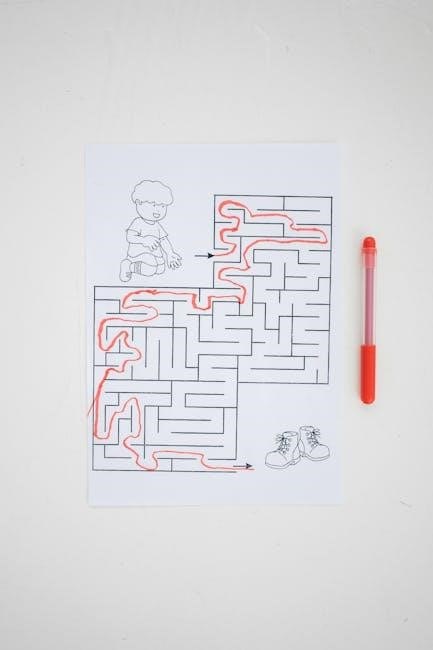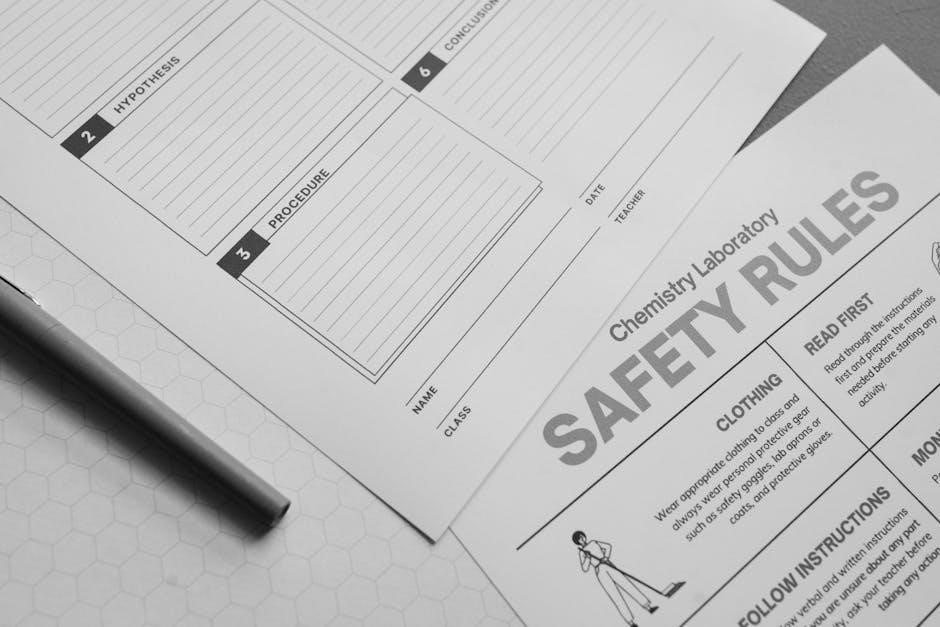Pia Mellody’s worksheets are powerful tools for addressing codependence, trauma, and boundary issues. Created by renowned therapist Pia Mellody, these exercises guide individuals through self-reflection and healing. Designed to explore family dynamics, trauma history, and relational patterns, the worksheets offer a structured path toward recovery and emotional growth.
Overview of Pia Mellody’s Work
Pia Mellody is a renowned therapist and author specializing in codependence, trauma, and boundary issues. Her work emphasizes the importance of understanding childhood experiences and their impact on adult relationships. Mellody’s approach focuses on identifying core issues such as self-esteem, boundaries, and immaturity, which stem from relational trauma. Her structured worksheets and exercises provide a practical framework for healing. Drawing from her book Facing Codependence and workshops at The Meadows, Mellody offers insights into toxic patterns and recovery strategies. Her methods are widely used in therapy settings, helping individuals break free from dysfunctional cycles and develop healthier relational habits.
Importance of Worksheets in Codependence Recovery
Pia Mellody’s worksheets are essential tools for codependence recovery, offering a structured approach to self-reflection and healing. They help individuals identify unhealthy patterns, process trauma, and establish boundaries. By exploring family dynamics, relational trauma, and personal growth, these exercises empower users to break free from dysfunctional cycles. Mellody’s worksheets promote accountability, self-awareness, and emotional clarity, making them invaluable for those seeking to address core issues like self-esteem and immaturity. They provide a clear path to understanding and overcoming codependent behaviors, fostering long-term personal growth and healthier relationships.
Core Issues in Pia Mellody’s Framework
Pia Mellody’s framework identifies core issues like self-esteem, boundaries, and childhood trauma as foundational to codependence and recovery. These issues are deeply interconnected, shaping behaviors and relationships.
The Five Core Symptoms of Codependence

Pia Mellody identifies five core symptoms of codependence: difficulty with self-esteem, boundary issues, trouble owning one’s reality, emotional management challenges, and relational problems. These symptoms stem from childhood trauma and developmental immaturity, often manifesting as people-pleasing, lack of assertiveness, and an inability to set healthy limits. Mellody’s framework emphasizes how these symptoms intertwine, creating cycles of unmanageability and intimacy issues. Her worksheets, such as the “Five Core Symptoms of Codependence” and “History of Trauma,” help individuals recognize and address these patterns, fostering self-awareness and recovery. By exploring these symptoms, individuals can begin to heal and develop healthier relational dynamics.
Self-Esteem and Its Role in Recovery
Self-esteem is a cornerstone of recovery in Pia Mellody’s framework, as it directly impacts an individual’s ability to heal from codependence and trauma. Mellody’s worksheets, such as the Family of Origin Questionnaire and Trauma Description Worksheet, guide users to explore their self-worth and value. By addressing self-esteem, individuals can break free from negative self-perceptions rooted in childhood trauma. Mellody emphasizes that self-esteem is not just about feeling good but about recognizing one’s inherent value. Her exercises help individuals develop a healthy sense of self, which is essential for setting boundaries, owning their reality, and fostering intimate relationships. Healing self-esteem is a critical step toward lasting recovery and emotional well-being.
Boundary Systems and Their Purposes
Pia Mellody’s work emphasizes the importance of boundary systems in recovery, defining them as invisible, symbolic fences with three key purposes. First, they protect individuals from external abuse by setting limits on others’ behavior. Second, they prevent individuals from abusing others, promoting accountability. Third, they help establish a clear sense of self, which is essential for emotional health. Mellody’s worksheets, such as those on boundary setting, guide users in identifying and implementing these systems. Healthy boundaries are crucial for stopping abusive patterns, fostering self-respect, and creating balanced relationships. They are a cornerstone of Mellody’s approach to healing and growth.

Key Worksheets for Trauma and Recovery
Pia Mellody’s worksheets include the Family of Origin Questionnaire, Trauma Description Worksheet, and History of Abuse Work. These tools help identify and process traumatic experiences, aiding recovery and healing.
Family of Origin Questionnaire
The Family of Origin Questionnaire is a foundational tool in Pia Mellody’s approach, helping individuals explore their childhood experiences and caregiver relationships. It guides users to list major caregivers, describe their interactions, and assess the emotional and physical environments of their upbringing. This worksheet also examines birth order and sibling dynamics, providing insights into how early family life shaped their self-esteem, boundaries, and relational patterns. By identifying these influences, individuals can address root causes of codependence and trauma, fostering a clearer understanding of their emotional and behavioral responses in adult relationships.
Trauma Description Worksheet
The Trauma Description Worksheet is a detailed tool designed to help individuals process and understand their traumatic experiences; It guides users to describe specific traumatic events, including who was involved, what happened, and the emotions felt during and after the incident. This exercise encourages reflection on the long-term effects of trauma and how it has influenced their behavior, relationships, and self-perception. By documenting their experiences, individuals can gain clarity on patterns of pain and begin the healing process. The worksheet is particularly effective for identifying triggers and understanding the connection between past trauma and current emotional responses.
History of Abuse Work
The History of Abuse Work worksheet helps individuals identify and document patterns of abuse they have experienced. It focuses on understanding the types of abuse—emotional, physical, or sexual—and their impact on self-esteem and relationships. Users are guided to reflect on how these experiences have shaped their behaviors and beliefs. This worksheet is particularly useful for recognizing cycles of abuse and developing strategies for breaking free from harmful patterns. By examining the past, individuals can gain insights into their present emotional struggles and take steps toward healing and recovery. It is a crucial tool for addressing deep-seated trauma and promoting emotional well-being.
Understanding Developmental Immaturity
Developmental immaturity arises from unresolved childhood trauma, hindering emotional growth and leading to unmanageability in relationships. It often manifests as difficulty with self-regulation and intimacy, requiring targeted healing strategies.
Overview of Developmental Immaturity Issues
Developmental immaturity stems from unresolved childhood trauma, impacting emotional growth and relational abilities. It often manifests as difficulty with self-regulation, intimacy, and healthy boundaries. Pia Mellody’s framework highlights how trauma disrupts normal developmental processes, leading to emotional unmanageability. Her worksheets guide individuals in identifying and addressing these issues, fostering greater self-awareness and maturity. By exploring family dynamics and trauma history, participants can better understand the roots of their immaturity and work toward healthier emotional responses and relationships. Mellody’s approach emphasizes the importance of healing these underlying issues to achieve lasting recovery and personal growth.
Impact of Childhood Trauma on Maturity
Childhood trauma significantly hinders emotional and psychological development, leading to developmental immaturity. According to Pia Mellody, unresolved trauma disrupts normal maturation processes, causing individuals to struggle with self-esteem, boundaries, and intimacy. Her worksheets help identify how traumatic experiences, such as abuse or neglect, impair growth. By exploring these connections, individuals can address the root causes of their immaturity. Mellody’s approach emphasizes the importance of recognizing and healing from childhood wounds to achieve emotional balance and maturity, ultimately fostering healthier relationships and personal well-being.

Addressing Toxic Love and Relationships
Pia Mellody’s worksheets address toxic love and relationships by exploring patterns of addiction and abuse. Her exercises help identify harmful cycles, fostering awareness and recovery from dysfunctional relational dynamics.
Toxic Addictive Love: Breaking the Cycle
Pia Mellody’s Toxic Addictive Love worksheet helps individuals recognize and break free from damaging relationship patterns. By identifying signs of addiction and abuse, participants gain clarity on unhealthy dynamics. The exercises guide users to assess their emotional and behavioral responses, fostering self-awareness. Mellody’s approach emphasizes understanding how these patterns stem from childhood trauma and codependency. Practical steps are provided to reestablish boundaries and develop healthier intimacy. This tool is crucial for those seeking to transform their relational experiences and achieve emotional freedom from toxic cycles.

Frequent Relationship Types in Sex Addiction
Pia Mellody’s work identifies common relationship patterns in sex addiction, such as sexual anorexia and sexual addiction. These types reflect how individuals compulsively avoid or pursue sexual connections. Mellody’s worksheet helps users recognize these cycles and their roots in trauma or codependency. By exploring these dynamics, individuals can address underlying emotional wounds and develop healthier intimacy. The exercises provide clarity on how these patterns manifest and their impact on relationships, offering a pathway to break free from destructive cycles and foster genuine emotional and physical connections.

Healing and Recovery Process
Pia Mellody’s worksheets guide individuals through a structured recovery process, helping them break harmful cycles and rebuild their sense of self. The exercises promote emotional healing and growth.
Setting Functional Boundaries
Setting functional boundaries is a cornerstone of Pia Mellody’s approach to recovery. Boundaries are symbolic fences that serve three key purposes: protecting oneself from abuse, preventing harm to others, and embodying self-identity. Mellody categorizes boundaries into three systems: external, internal, and spiritual. External boundaries protect the body, internal boundaries manage emotions, and spiritual boundaries connect individuals to a higher power. Worksheets guide individuals in identifying and implementing these boundaries, fostering healthier relationships and self-regulation. By establishing clear limits, individuals reclaim personal space and emotional autonomy, essential for healing from codependence and trauma. Mellody’s framework emphasizes boundaries as tools for empowerment and self-respect.
Instructions for Trauma Description Worksheet
Pia Mellody’s Trauma Description Worksheet guides individuals in documenting their traumatic experiences. Users are asked to list traumatic events, detailing who was involved, what happened, and the emotions felt during and after the event. The worksheet also prompts reflection on the impact of these traumas and how they have influenced current behaviors and relationships. By systematically recording these experiences, individuals can identify patterns and gain clarity on unresolved wounds. The exercise encourages honesty and self-compassion, helping users process trauma and move toward healing. This tool is particularly effective for those addressing codependence and relational trauma in their recovery journey.
Pia Mellody’s worksheets are invaluable tools for healing and growth, guiding individuals through self-reflection and recovery from trauma, codependence, and relational challenges with clarity and compassion.
Final Thoughts on Using Pia Mellody’s Worksheets
Pia Mellody’s worksheets are transformative resources for personal growth and healing. By addressing core issues such as self-esteem, boundaries, and trauma, these tools empower individuals to confront past wounds and develop healthier relational patterns. Their structured approach provides clarity and focus, making complex emotional work more accessible. Whether used independently or with a therapist, Mellody’s worksheets offer profound insights and practical steps toward recovery. Regular use fosters self-awareness, accountability, and emotional resilience, ultimately guiding users toward a more authentic and fulfilling life. These worksheets are a cornerstone for anyone seeking to overcome codependence and build lasting inner peace.